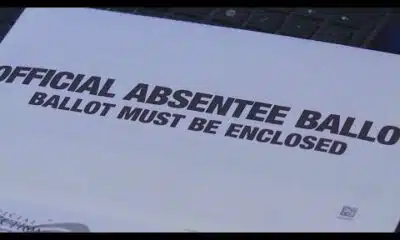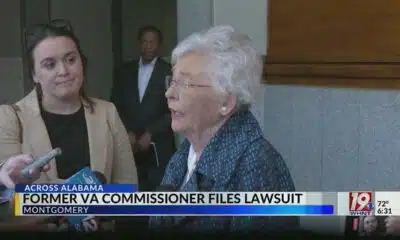Mississippi News
Federal judges refuse to rule on constitutionality of House map
Divided panel of federal judges refuses to rule on constitutionality of redrawn U.S. House map
A three-judge federal panel that has been overseeing the redistricting of Mississippi’s congressional seats since the early 2000s has declined to rule on whether the state’s four newly drawn U.S. House districts are constitutional.
Judges E. Grady Jolly of the U.S. 5th Circuit and David Bramlette of the Southern District of Mississippi refused to rule on the argument made by the NAACP and other groups that the four new districts are racially gerrymandered and dilute the voting strength of African Americans.
The third member of the panel, Judge Henry T. Wingate of the Southern District of Mississippi, said the majority was “shirking” its responsibility by not hearing the case. Wingate also wrote separately that he did not totally discount the arguments of racial gerrymandering.
But Wingate said, “It is this judge’s view … that the citizens of Mississippi will be better served by giving their elected representatives the chance to revisit these issues in the upcoming 2023 legislative session.”
Additionally, the judges opted to end the panel’s oversight of the state’s U.S. House elections altogether.
READ MORE: Mississippi NAACP questions constitutionality of redistricting plan
Jolly and Bramlette said their ruling did not prevent the NAACP and others from filing a separate lawsuit arguing the plan approved by the Legislature in January and signed into law by Gov. Tate Reeves is unconstitutional because of the alleged racial gerrymandering.
But in the meantime, elections are slated to go forward this year under the plan approved by the Legislature. The primary elections are scheduled for June 7 with the general election set for November.
All of the judges agreed that the elections should not be postponed.
The NAACP, One Voice, Black Voters Matter Capacity Building Institute and other organizations wanted the three-judge panel to halt the use of the legislative plan and instead use a plan proposed by the NAACP or instead develop its own plan. The Mississippi Republican Party and others had argued that the legislative plan is constitutional, but they wanted the judges to find the plan constitutional before relinquishing their jurisdiction of the case.
The three-judge panel initially drew a congressional map for the state after the 2000 U.S. Census when the Legislature could not agree on a redistricting plan. The state lost a congressional district based on the results of the 2000 Census because of slow population growth.
Then in 2011, the three-judge panel again redrew the districts to adhere to population shifts found by the 2010 Census after the Legislature again was unable to agree on a congressional map.
The Legislature did agree on a plan after the 2020 Census, though every African American state lawmaker in both the House and Senate voted against it.
READ MORE: Lawmakers redraw congressional districts for first time since early 1990s
Under the plan approved by the Legislature, Congressional District 2, the state’s only Black majority district, will run nearly the entire western length of the state with Adams, Amite, Franklin and Walthall counties in southwest Mississippi being added to the district. The district will extend from Tunica in northwest Mississippi to the Louisiana-Mississippi border in southwest Mississippi. The only county that borders the Mississippi River not in the district is heavily Republican DeSoto County.
District 2 is the only one of the state’s four congressional districts to lose population since 2010 — more than 9%, or about 65,000 people.
District 2 incumbent Rep. Bennie Thompson, the state’s lone African American and Democratic member of the congressional delegation, supported the NAACP proposal to make District 2 more compact with a smaller Black majority than in the legislative plan. The NAACP argued under its plan an African American candidate could still be elected in the 2nd District while allowing Black voters to have more of an impact in other districts in the state.

This article first appeared on Mississippi Today and is republished here under a Creative Commons license.
Mississippi News
Suspect in Charlie Kirk killing is charged with murder as prosecutor says DNA found on rifle trigger
SUMMARY: Tyler Robinson, 22, was charged with the murder of conservative figure Charlie Kirk, shot Sept. 10 at Utah Valley University. Robinson confessed via text to his partner and left a note expressing intent to kill Kirk, citing hatred. DNA linked Robinson to the rifle used. Prosecutors revealed Robinson planned the attack for over a week and targeted Kirk, a key conservative youth leader. Robinson’s political views shifted after dating a transgender man, causing family tensions. After the shooting, Robinson discarded evidence and urged his partner to delete texts. FBI investigates possible wider connections. Charges include murder with potential death penalty enhancements.
Read the full article
The post Suspect in Charlie Kirk killing is charged with murder as prosecutor says DNA found on rifle trigger appeared first on www.wjtv.com
Mississippi News
Suspect in Charlie Kirk assassination believed to have acted alone, says Utah governor
SUMMARY: Tyler Robinson, 22, was arrested for the targeted assassination of conservative activist Charlie Kirk in Orem, Utah. Authorities said Robinson had expressed opposition to Kirk’s views and indicated responsibility after the shooting. The attack occurred during a Turning Point USA event at Utah Valley University, where Kirk was shot once from a rooftop and later died in hospital. Engravings on bullets and chat messages helped link Robinson to the crime, which was captured on grim video. The killing sparked bipartisan condemnation amid rising political violence. President Trump announced Robinson’s arrest and plans to award Kirk the Presidential Medal of Freedom.
The post Suspect in Charlie Kirk assassination believed to have acted alone, says Utah governor appeared first on www.wjtv.com
Mississippi News
Americans mark the 24th anniversary of the 9/11 attacks with emotional ceremonies
SUMMARY: On the 24th anniversary of the 9/11 attacks, solemn ceremonies were held in New York, at the Pentagon, and in Shanksville to honor nearly 3,000 victims. Families shared personal remembrances, emphasizing ongoing grief and the importance of remembrance. Vice President JD Vance postponed his attendance to visit a recently assassinated activist’s family, adding tension to the day. President Trump spoke at the Pentagon, pledging never to forget and awarding the Presidential Medal of Freedom posthumously. The attacks’ global impact reshaped U.S. policy, leading to wars and extensive health care costs for victims. Efforts continue to finalize legal proceedings against the alleged plot mastermind.
The post Americans mark the 24th anniversary of the 9/11 attacks with emotional ceremonies appeared first on www.wcbi.com
-
News from the South - Kentucky News Feed7 days ago
Lexington man accused of carjacking, firing gun during police chase faces federal firearm charge
-
News from the South - Alabama News Feed7 days ago
Zaxby's Player of the Week: Dylan Jackson, Vigor WR
-
News from the South - Arkansas News Feed7 days ago
Arkansas medical marijuana sales on pace for record year
-
News from the South - North Carolina News Feed5 days ago
What we know about Charlie Kirk shooting suspect, how he was caught
-
Local News7 days ago
US stocks inch to more records as inflation slows and Oracle soars
-
Local News6 days ago
Russian drone incursion in Poland prompts NATO leaders to take stock of bigger threats
-
Local News Video6 days ago
Introducing our WXXV Student Athlete of the Week, St. Patrick’s Parker Talley!
-
News from the South - North Carolina News Feed5 days ago
Federal hate crime charge sought in Charlotte stabbing | North Carolina


















































